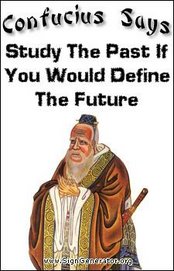Most just people think of fictitious and light-hearted stories when they hear the word 'mythology,' however the myths of old aren't just tales, fables, stories, and fiction.
Almost all myth begins as a valid 'explanation' or the most acceptable or necessary explanation available at the time of creation. Often the myth will be deliberately symbolic and dramatic - to run home a point about something that the creator feels is important. The original myth may deal with something problematic that the 'teller' needs solved, detailed, resolved, or represented.
Ancient people created 'explanations' to tell why things occurred all around them. This gave meaning to such things as natural events (daybreak, sunset, storms, seasons), animal behaviors (migration, mating, hunting activity), and other puzzling things in the ancient world. Instead of feeling that all occurrences, events and sights around them were all random and without meaning, 'explanations' gave the Ancients some PERSPECTIVE upon the world they were viewing, living in and interacting with.
In present day, we have mythical explanations, too - even among all the technological advances, data and knowledge that we possess above what the Ancients developed years ago.
In part - none of the advances we appreciate today would have occurred without myth-making taking place as a pre-requisite. Many of the greatest scientific discoveries have happened due to scholars and scientists seeking to DISPROVE or PROVE information and concepts surrounding myth. Without the original myth or story, there remains 'lack of wonder' about life situations, lack of basis for problem-solving, lack of 'hypothesis' - simply, one does not wonder why things are the way they are. Once one does WONDER - one can create a story which will last within reason - until it is either proved as entirely acceptable - or unacceptable.
Something that can be considered 'modern' myth - are 'common urban legends.' Most of these are difficult for the average person to 'disprove' or 'prove,' so information exists as 'stories' or myth, passed along from person to person - taken quite literally on 'faith' alone. Ghost stories, stories about strange coincidences, patterns of events - all fall into the large paradigm of things called 'MYTH.' Some of the urban legends seemingly more far-fetched are, in fact, mirrors of societal fears - used to serve as a heightened symbolic message with a purpose...warnings, suggestions (Don't go in the woods near the edge of town after sundown...) for some purpose of control. A virtually universal example is the societal and parental warning to children about not wandering away from home...
or else...
'The Boogeyman will get you!'
In all of this, it becomes IMPORTANT for people to value 'myth' and not disregard all myth as 'story-telling' or fiction. Much myth IS, in fact, fiction - but is symbolic, containing a bigger, more important message that often should not be ignored. There may not be a boogeyman, but it is still very definitely unwise for children to wander away from home after dark. On the other hand, if 'danger' is represented as the boogeyman, then DANGER certainly exists for children who wander away from home after dark. In any case - the myth about the Boogeyman isn't as ridiculous or fictitious as we might think, if we are the type to scoff at myth or stories.
Myth blends into urban legend, Biblical references, literature, science, health and wellness, our understanding of the animal and plant kingdoms - virtually permeating into all other realms of our existence. Not to mention the plain fact of the cathartic (the venting of stored-up emotions and the forgetting of real life for a while) value of 'stories,' in our hectic everyday lives. Certain presentations of myth are, indeed, plain old fictitious stories - designed for entertainment - however, even these can be said to have value.
I'll be back soon to post about some of the best recognized mythical characters - The Olympians.
Thursday, March 15, 2007
Mythology - Not just 'stories'
Labels:
Boogeyman,
catharsis,
fables,
fiction,
Greek Gods,
Greek Myths,
legend,
literature,
myth,
Mythology,
Myths,
Myths and Legends,
stories,
tales,
urban legend,
Urban Legends
Subscribe to:
Post Comments (Atom)












No comments:
Post a Comment